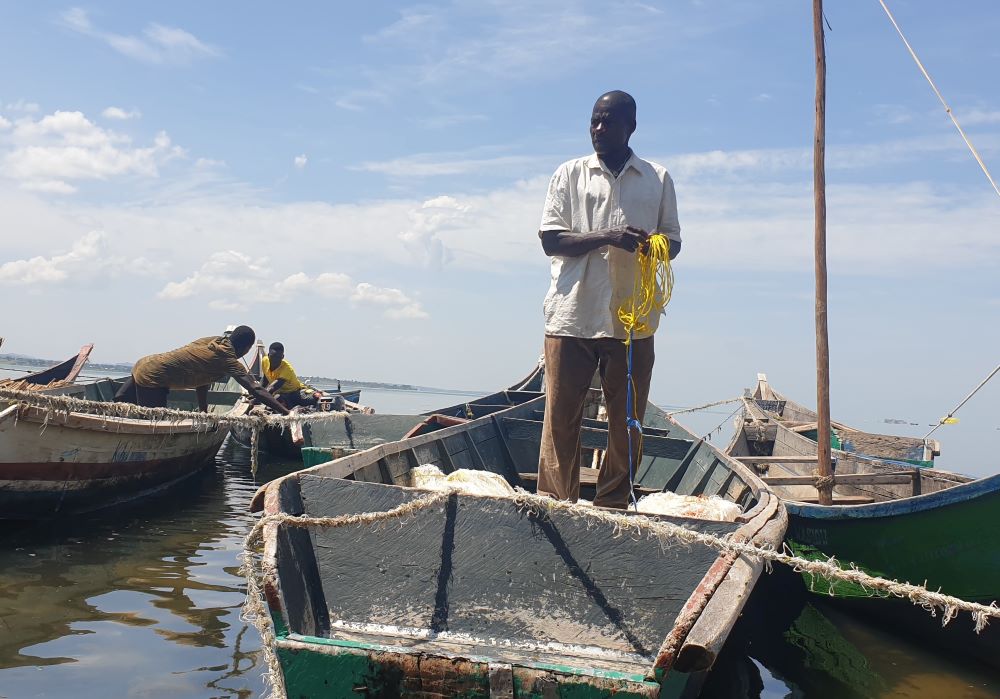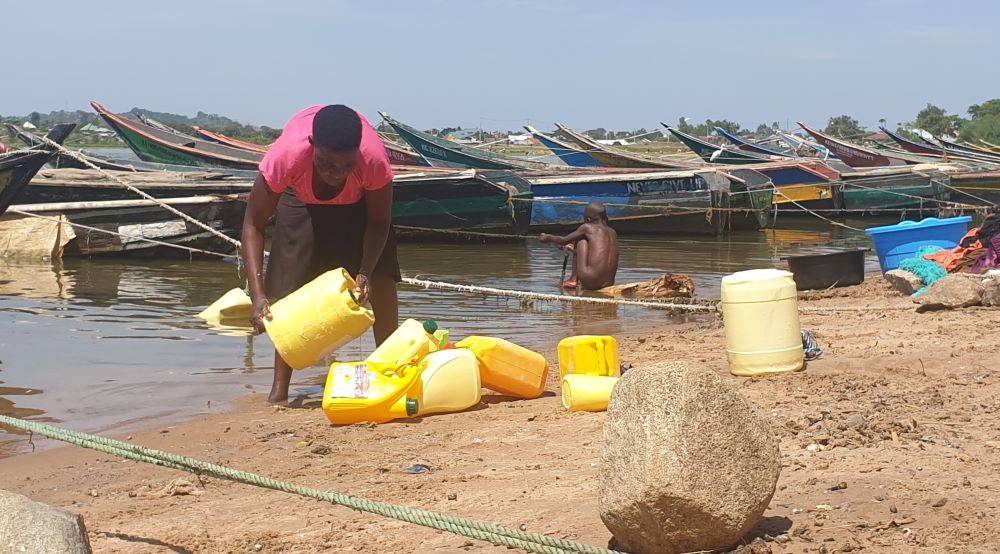
A fisherman spreads his net at the shores of Lake Victoria Jan. 26, 2022. Activities at the lake have been hampered by runaway pollution. (Ian Byron)
Seemingly pristine from a distance, Lake Victoria, one of the world's largest freshwater lakes, is at risk from pollution and climate change impacts. A closer look reveals a scene of filth that emanates a foul odor.
Second in size only to Lake Superior in North America, Lake Victoria's nearly 69,000 square kilometer surface and more than 3,000-kilometer shoreline is shared by Kenya, Uganda and Tanzania. With a GDP of $3-4 billion, the lake supports at least a quarter of the total human population across East Africa and supports 40 million people. The lake basin — an area of 258,700 square kilometers — is used by communities and industries as a source of food, energy, water and transport.
Despite its prominence, Lake Victoria has turned into an eyesore. It is currently a sink for human, agricultural and industrial waste, leading to mass aquatic deaths, algae and the spread of hyacinth, a ferocious waterweed.
Locals have been grappling with the unbearable stench enveloping beaches. It threatens businesses and tourism in Kisumu and neighboring towns in Kenya, as it is beginning to drive away customers and tourists.
Felix Ochieng, a boater who ferries tourists across Lake Victoria at Dunga beach, said his business has been adversely affected as visitors who were frequenting the beach to enjoy boat rides have since kept away from the excursions due to the awful smell.
"Business has really gone down. The stench from the lake has kept potential customers and revelers at bay," Ochieng said.

A woman cleans her utensils at Dunga Beach in Kisumu, Kenya. Locals have raised concerns over the current situation of the lake. (Ian Byron)
When Peter Okoth began fishing there in 2010, he earned Sh100,000 ($705.47) per catch. Today he goes home with less than Sh5,000 ($35.27). He attributed his plight to increased pollution over the years.
"A strange growth on the waters is hampering fishing," he told EarthBeat.
He's referring to the water hyacinth, which depletes the lake's oxygen, blocks sunlight, obstructs water transport, and provides habitat for mosquitos and snails that carry malaria and other dangerous bacteria.
"The weed grows where the water is settled," said Christopher Aura, assistant director of the Kenya Marine and Fisheries Research Institute, or KMFRI.
"All the beaches are marooned in dark molds and we have been witnessing mass fish deaths, including those in cages. We are scared of using the water from the lake. We do not know what awaits us when we use this water," Maureen Achieng, a local resident, told EarthBeat.
Fearing further losses, fish farmers are harvesting immature caged fish to sell at a throwaway price of Sh10 ($0.01) each, down from Sh500 ($5.00), which they eke from mature fish. Some wealthier people have taken advantage of the situation and have accessed cold chain facilities where they store the fish hoping that the price may increase.
"Caged fish and breeding grounds are running empty; we have lost a lot of investment due to pollution," Achieng said.
She and other locals attribute the mass fish deaths and the nauseating stench to the discharge of untreated wastewater and the lack of enforcement of discharge standards.
Fr. Paul Ogallo of Rakwaro Parish in the Diocese of Homa Bay attributes the rot in Lake Victoria to pollution from garbage that is haphazardly disposed along river banks.
Experts from KMFRI said that the current phenomenon is exacerbated by global warming, as temperature changes disrupt the typical decomposition process of debris.
Numerous rivers empty agro-chemicals and farm wastes into the lake. By some estimates, up to 70% of pollution is linked to land use activities from the catchment.
"These rivers pass through our immediate neighborhood, so if we maintain our environment then definitely the rivers will deposit fresh water into the lake and thus maintain its freshness," Ogallo said, and "the church must move with speed to free our water sources from garbage."
In his 2015 encyclical "Laudato Si', On Care for Our Common Home," Pope Francis says conserving the ecosystem and fighting climate change is everyone's duty.
"A lot has to be done as a church and to rescue the situation. We have to practice reconstruction of the moral fabrics of the society," said Ogallo.
Currently, Ogallo and others are working around nearby towns to clear garbage that is deposited at the river banks.
Fr. Joshua Mege, a priest of the Homa Bay Diocese, says there is a need to develop a new catechesis that is in tandem with the current modernity.
"We have an obligation to step up vegetation cover by the current generation so as to mitigate the pollution aspect. With proper vegetation cover, we will be able to reduce erosion and subsequent runoffs into the lake by a huge margin," he said.
Advertisement
The parish priest, however, runs a program with youth across the Homa Bay Diocese and in Kenya where they evangelize through drama, music and nature conservation.
It is a multi-sectoral approach, as the destruction is not only done by those living along the lakeshore, some of this affluent travels from highland areas.
"The counties are yet to implement climate change policy," he said. "Towns are choking with filth which ends up being drained into the water bodies draining into the lake."
"During heavy rains, poorly disposed waste is washed into the lake from the slums," said National Environment Management Authority county director Tom Togo.
According to NEMA, more than 80% of Kisumu may lack infrastructure to manage liquid wastes.
Kisumu's sewage plant at Kisat, with a design capacity of 9,000 cubic meters, now receives 15,000 cubic meters of untreated effluent — way beyond its capacity, and this finds its way into the lake.
"The church has done enough to boost forest cover but not all religious leaders are taking aggressive steps towards climate change mitigation. Most religious leaders are obsessed with preaching to an extent that the natural fabrics of the society are neglected," Mege said.





